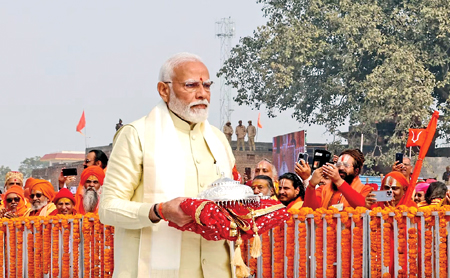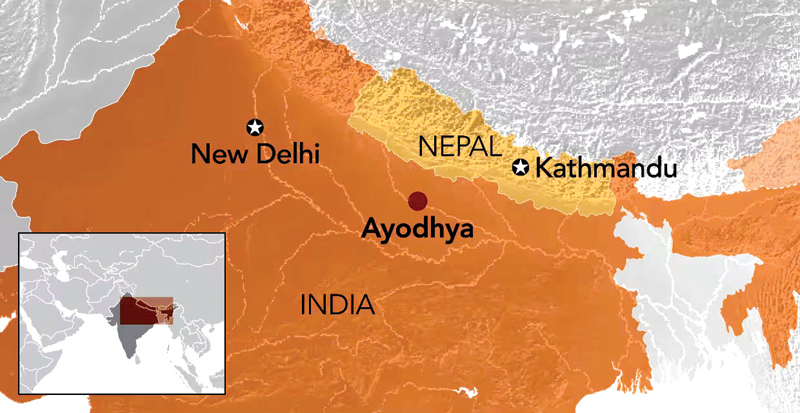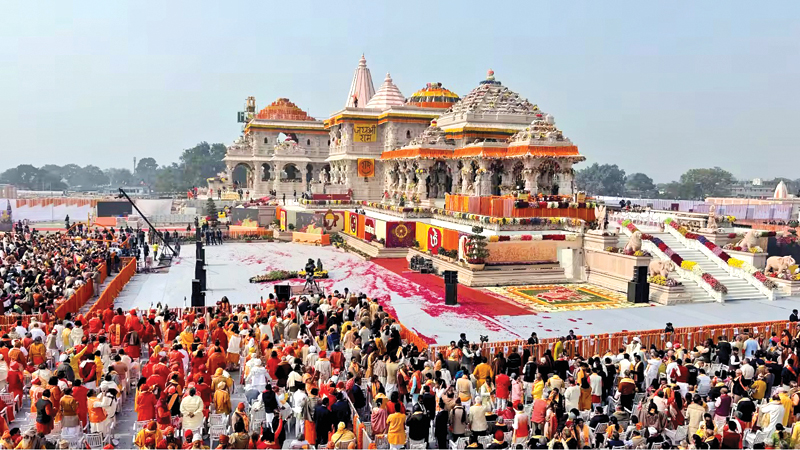Indian Prime Minister Narendra Modi on Monday led the inauguration of a sprawling Hindu temple built on a site that was once a flashpoint of Hindu-Muslim conflict, an event seen as a milestone on his road to reelection.
The Ram Mandir shrine in the northern city of Ayodhya is still under construction on land that was handed to Hindus by India’s top court in November 2019, after decades of dispute. A 16th-century mosque, Babri Masjid, on the same site was demolished by a Hindu mob in 1992, triggering communal riots that left nearly 2,000 people dead.
Modi, whose Hindu nationalist Bharatiya Janata Party (BJP) has made building a new temple on the site a key promise of election platforms since the 1990s, laid the foundation stone in August 2020. Three and a half years later, he joined the temple’s consecration ceremony, just a few months before he seeks a third term as prime minister in general elections due in April and May.
The Prime Minister entered the shrine’s premises carrying offerings for the Hindu deity to which it is dedicated, Lord Ram. Before the event, he had been fasting for 11 days and touring temples linked to Ram in the country’s south.
“Jai Shree Ram”

Indian Prime Minister Narendra Modi arrives for the opening of the temple on Jan. 22
An idol of Lord Ram, depicting him as a 5-year-old child, was unveiled during the ceremony as the Prime Minister and priests offered prayers and thousands of devotees outside chanted “Jai Shree Ram” (Hail Lord Ram) and Air Force helicopters showered flower petals over the grounds. Ayodhya was decorated with flowers, rangoli (powder color paintings on the ground) and earthen lamps, giving it the feel of Diwali, a Hindu festival marking the return of Lord Ram to Ayodhya after 14 years in exile.
“Today, our Ram has arrived [home] after a centuries-long wait,” Modi told a gathering at the temple. “Our Ram Lalla will not live in a tent anymore, he will now live in this divine temple.”
Hinting at the history of tensions over the site, Modi said, “There was a time when some people used to say that if this temple is built then [the country] will burn. … [However], we are witnessing that the construction has not led to any fire but [a new] energy.”
“Ram is not fire, Ram is energy; Ram is not dispute, Ram is solution; Ram not only belongs to us, Ram belongs to everyone; Ram is not just present, Ram is eternal.”
Modi was accompanied by high-profile figures including Mohan Bhagwat, chief of Rashtriya Swayamsevak Sangh (RSS) — the Hindu nationalist ideological parent of the BJP — and Yogi Adityanath, chief minister of the State of Uttar Pradesh.
Experts say the temple could create a strong election tailwind for Modi by tapping into the religious passions of his base.
“The Ram temple inauguration will certainly provide huge traction to Modi’s larger-than-life political status and the image of the [BJP],” Praveen Rai, a political analyst at the New Delhi-based Centre for the Study of Developing Societies, told Nikkei Asia. He said the event marks the “culmination of the relentless quest of [the] majority community in India for regaining its lost cultural glory and religious pride.”
Hindus believe that the site is the birthplace of Lord Ram, one of their most revered deities, and that the Babri Masjid was built there by the Muslim Mughal ruler Babur in 1528 after destroying an ancient temple. The 2019 court verdict came after the Archaeological Survey of India presented evidence of non-Islamic ruins beneath the demolished Babri Masjid.
Although many Muslims were unhappy with the ruling, the Uttar Pradesh Sunni Central Waqf Board, one of the main litigants on the Muslim side, “humbly accepted” the judgment. The court did call the destruction of the Babri Masjid unlawful and ordered the allotment of a separate parcel of land within Ayodhya to Muslims for construction of a mosque, which has yet to be built.
The opening of Ram Mandir on Monday comes well ahead of its expected completion in December 2025. Engineering company Larsen & Toubro has finished the first of three phases, including the main temple on the ground floor, with the garbhagriha or holy sanctum. The entire project is estimated to cost 15 billion rupees ($180 million).
Nripendra Misra, chairman of the independent Shri Ramjanmabhoomi Temple Construction Committee, said the temple is being built without financial assistance from the government. Rather, about 40 million Indians donated to the project. Misra said the total received was more than double the construction estimate, at over 30 billion rupees.
Each day, at least 100,000 devotees are expected to visit the temple, which sits on a 1.12-hectare site inside a 28.7-hectare complex that will also house a pilgrimage centre and a museum. To better serve the crowds, a new international airport opened in Ayodhya late last month. New hotels and shops are sprouting up, while roads and rail services are being improved.
The consecration was a glamorous affair, with invitees including Bollywood celebrities, politicians, sports stars and industrialists such as Reliance Industries Chairman Mukesh Ambani and his wife Nita Ambani. Senior leaders from India’s main opposition Congress party, including Mallikarjun Kharge, Sonia Gandhi and Adhir Ranjan Chowdhury, were also invited but “respectfully” declined to attend.
Congress accused the government of politicising the temple in the officially secular country.
“Lord Ram is worshipped by millions in our country. Religion is a personal matter. But the RSS/BJP have long made a political project of the temple in Ayodhya,” Jairam Ramesh, Congress’ general secretary for communications, said in a Jan. 10 statement.

Electoral gain
“The inauguration of the incomplete temple by the leaders of the BJP and the RSS has been obviously brought forward for electoral gain,” Ramesh said.
Some in the Muslim community made similar arguments.
In a statement on social media on Jan. 13, Khalid Saifullah Rahmani, president of the All India Muslim Personal Law Board, said Modi’s inauguration of the temple amounted to the “murder of justice and secularism.”
Separately, Salim Engineer, vice president of Jamaat-e-Islami Hind, another Muslim body, told reporters on Jan. 6 that the temple inauguration “should not be politicised, patronised and used to polarise.”
“We feel the Ram Mandir inauguration is becoming a tool for political propaganda and a means of reaping electoral dividends,” he said, according to a report on the organisation’s website.
But others said there are no hard feelings.
Athar Hussain, secretary of the Indo-Islamic Cultural Foundation — tasked with the construction of a mosque on the alternative site — said that Muslims had indeed accepted the court decision. “The Muslim community has no negative approach toward the consecration ceremony or the temple,” he was quoted as saying by the Times of India newspaper.
Vijay Shankar Tiwari, a senior leader of Vishwa Hindu Parishad, part of a family of Hindu nationalist organisations headed by the RSS, told Nikkei that the temple is a symbol of faith for more than a billion Hindus. But he stressed that “people of all faiths, if they wish, can visit the temple.”
The project resonates with many ordinary Hindus. One electrical engineer at the construction site in Ayodhya, who preferred not to be named, told Nikkei Asia in late December that he had left his job to join the project. “I feel blessed to be here and to be able to contribute in some way to the temple construction,” he said.
In his address at the temple, Modi said the opening date, Jan. 22, is “not just a date on the calendar, it is the origin of a new cycle of time.”
“People will talk about this date, this moment, even after 1,000 years.”
-asia.nikkei.com






